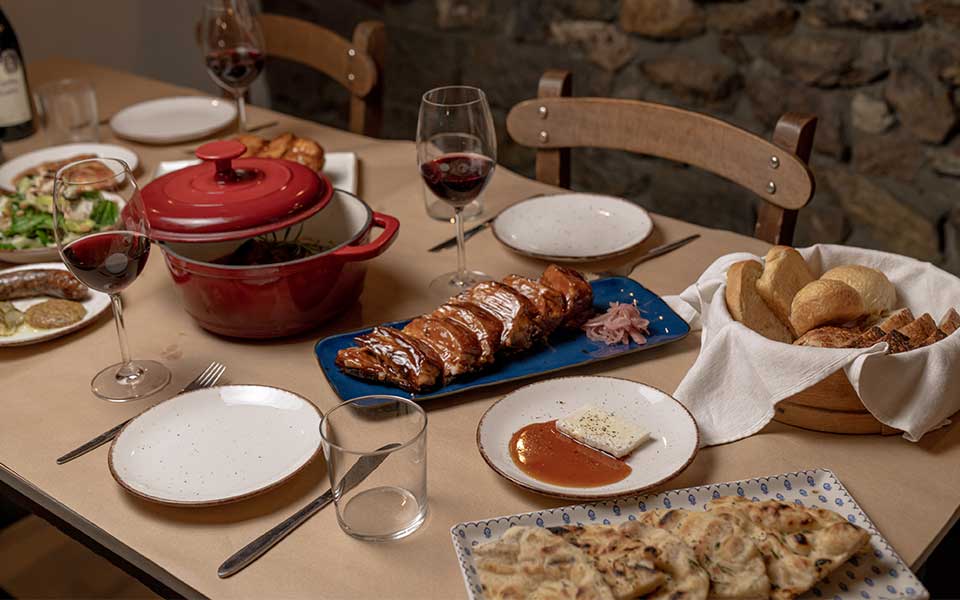There is some excellent farming country along the old road that runs from Thessaloniki to Edessa. Kallipoli, a tiny village, is located not far from Giannitsa. The two primary commercial crops in this area are peaches and asparagus, but there are many others; good things are growing in every direction. That’s handy, because almost everything at Vasilikos – save the olive oil and some citrus sent up by a friend in Kalamata – is grown locally. Much of it is even grown right behind the restaurant; as January turns to February, there are lettuces, herbs, some beets, carrots, and cabbages. The first zucchini will appear in a short while, followed by tomatoes and string beans.
Vasilikos is a destination-worthy, low-key Greek bistro that serves serious food. Melina and Anastasia Tsiloglanidou greet and serve, while Vassilis Barbarousis, Melina’s husband and an experienced, inspired chef, works in the open kitchen. That’s it, just the three of them; sourcing, preparing, serving, and cleaning up, with Vassilis at the hearth. They manage well; the meals here are quite memorable.
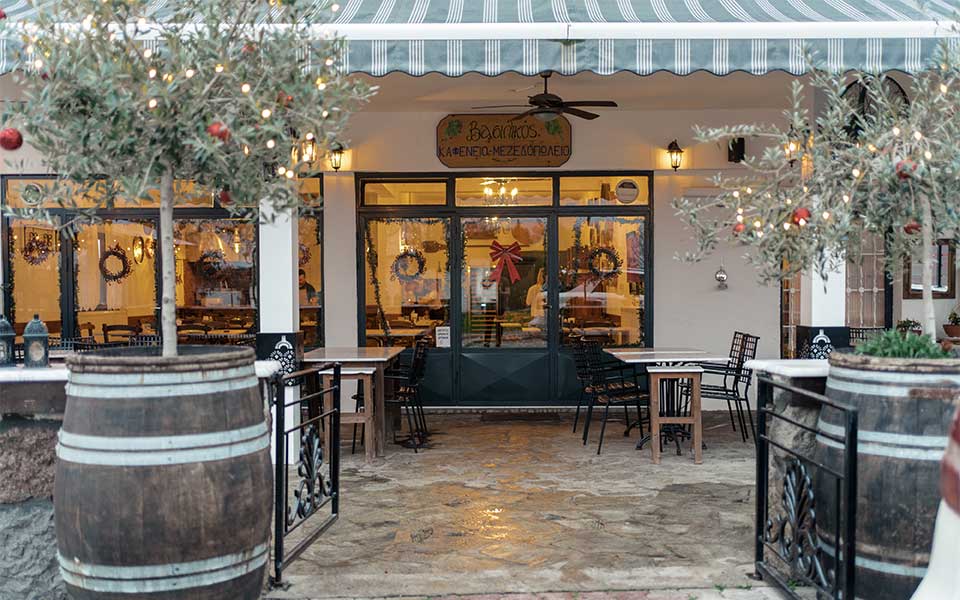
© Nikos Karanikolas
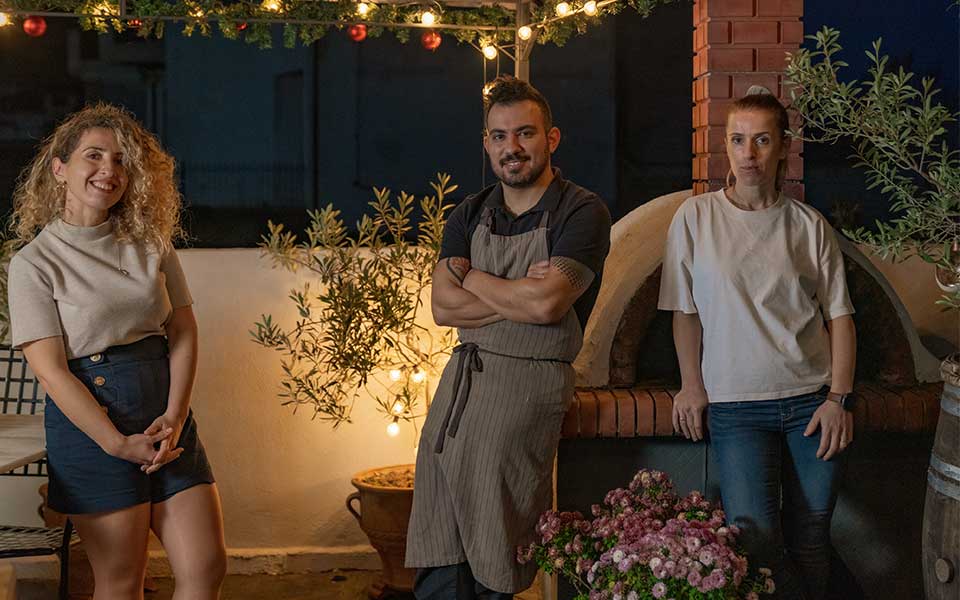
© Nikos Karanikolas
Melina and Anastassia are from Kallipoli, and this minimal concrete room with a checkerboard floor used to be their aunt’s bakery. Now there’s a brick hearth glowing in the corner, and a wood-burning stove. The copper pots and baking pans on the walls, along with a framed needlepoint by the door, add to the coziness of the environment. The lighting’s perfect; low but casting enough brightness about the small space to be able to see the food, which is good because you wouldn’t want to miss it. These would be head-turning, serious plates in any city, all the more so for being modest and straightforward.
Vegetables receive the attention that is typically reserved for proteins: a spell in the wood oven concentrates the sweetness of a plate of whole carrots. A finish over the coals (not commercial briquettes; the coals are from fragrant local wood) gives them a nice char, a hint of smoke, and, most importantly, a sense of occasion, while the bed of double-strained local yogurt and a citrus and spice dressing adds main-dish gravity. Next come mushrooms, also grilled; on a January evening, they are served with diced oranges and thin fennel slices. Vasilikos does not serve fries; instead, you get silky slabs of potato with promising grill marks that are seasoned with a splash of aromatic oil and a crumble of local goats’ milk feta. We had more feta warmed and served with some of their own tomatoes that Vasilis had dried out in the oven, bringing out the tang while keeping them juicy.
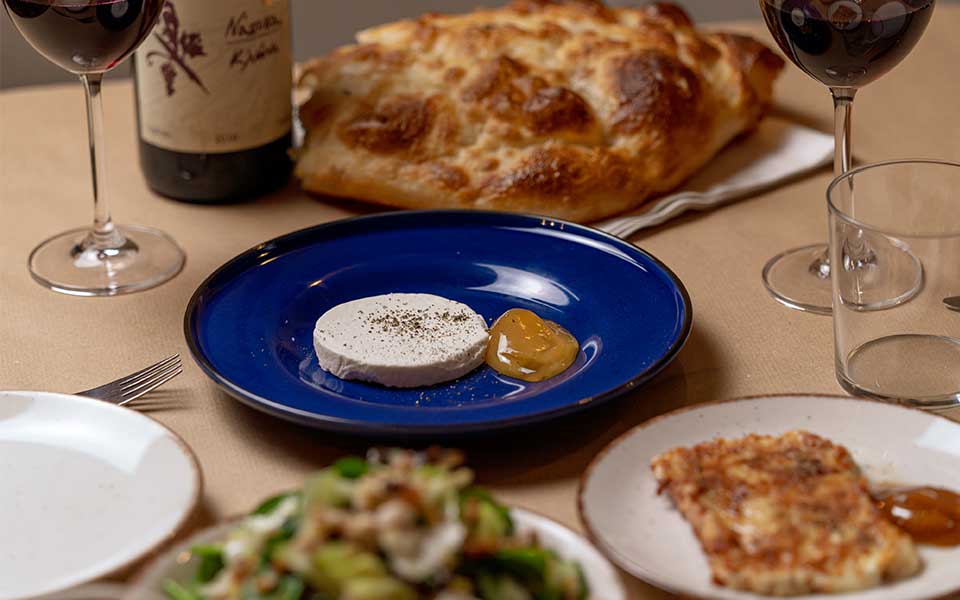
© Nikos Karanikolas
The cheeses are made by Nikos Katsamperis in neighboring Kariotissa. Vasilikos is at the heart of a community of quality purveyors, offering meats such as pork from a native breed of pig (the ‘Ellinikos hoiros’ – Greek pig) raised on Makis Tapkos’s farm in Esovalta (17 km away). Vassilis gets the whole animal and does the butchering himself; their aim is to get as close to zero-waste as possible, but more importantly, in his words, “to honor the animal.” He does this by using everything he can. The house-made charcuterie, such as the nduja served with a local burrata, is delicious, with the heat balanced by the sweetness of charred peppers.
The core menu – in fact, four menus, one for each season – is supplemented with daily inspirations. However, due to popular demand, the “sidirodromos” (‘railroad tracks,’ for the rack of ribs) – slow-smoked pork from the wood oven, with a crisp crust lightly glazed – is a year-round staple. The meat crumbles under the fork, contrasting with the crispy bronzed skin. The “biftekia” – seasoned burgers (all pork, no beef, for extra juiciness) – are classic comfort food, erved over a silky baby-soft potato puree. Manestra – second in the Greek comfort-food triad – arrives hot and fragrant under the cone-shaped lid of a tagine. The dish is usually made with beef, cooked in a red sauce with kritharaki (Greek orzo, a small, rice-shaped pasta); Vassilis’ manestra features tender local lamb, its almost musky meatiness soaked up by the saucy pasta, with very little tomato to interfere.
Chicken and potatoes, or “kotopoulo me patates,” complete the Greek triad. A few generations ago, a chicken such as this one – local, hormone-free, fed right, and raised in the wild (these by Konstantinos Galanos, 20 km away in Edessa) – would have been a commonplace pleasure, but not anymore. Now, a taste of the real thing, seasoned gently and roasted in the wood oven with potatoes, redefines the homestyle classic. The pork, manestra, and chicken were from the day before; dishes from the oven “need a day to rest,” Melina explains, so they always make them ahead of time and then reheat them, crisping up the chicken and pork over the coals.
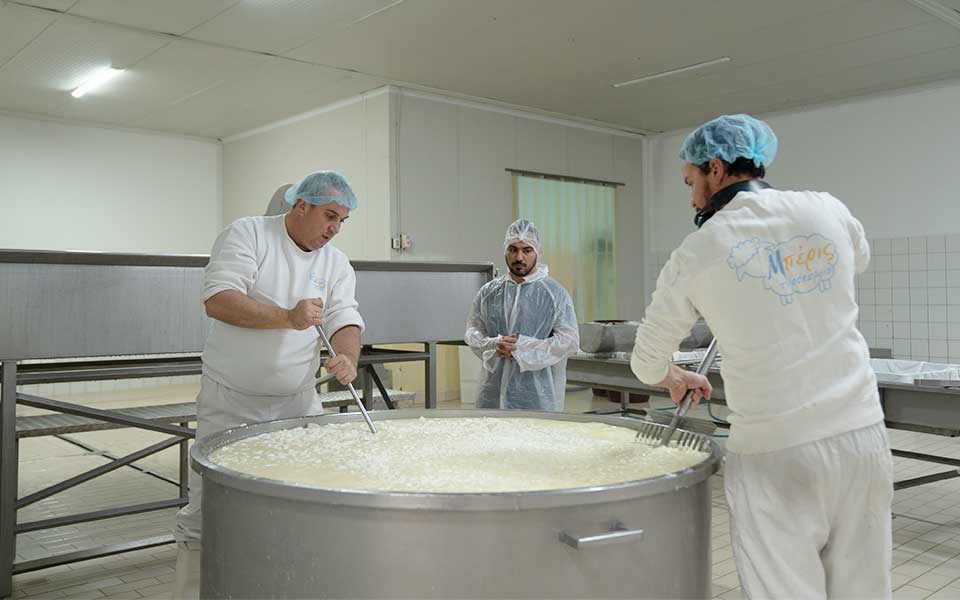
© Nikos Karanikolas
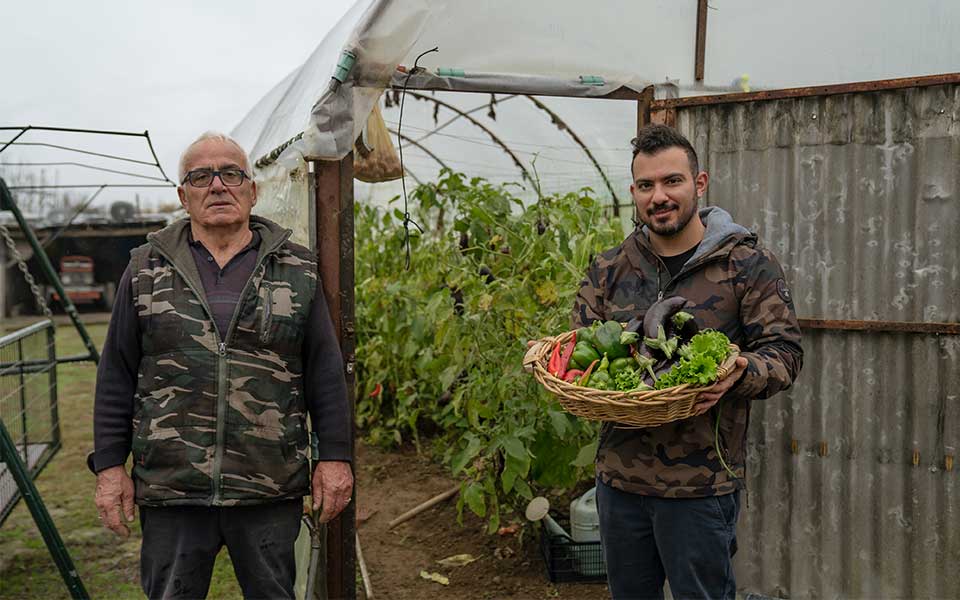
© Nikos Karanikolas
That sounds like a lot of food, and it was, but there was no excess anywhere – nothing too heavy, and above all, everything was as honest and true to its identity as possible. There were only three of us at the table: my friend Janet from Goumenissa and Maria Tatsis, the youngest (fourth generation) winemaker at the Ktima Tatsis winery. We received an extra warm welcome when we arrived with Maria; this is one of only a few restaurants that Tatsis supplies. Vasilikos sources all their wines, as well as their produce, meats, and cheeses, directly from the producers. “Having these personal relationships is important to us,” Vassilis says. Melina suggested we drink a Tatsis Xiropotamos, and Maria graciously obliged. This Xinomavro Blanc de Noir had the complexity of a red with a little more heft than a white would normally have – just right for holding up to the protein dishes – plus a lift of acidity and plenty of fragrance and finesse – a good white for red wine lovers.
By any standard, this was a memorable meal. Yet the conversation stood out just as much. It wasn’t so long ago that a focus on organic, seasonal, sustainable, local, and humane foods was noteworthy. Even as it became more common, it was still branded as somehow revolutionary, something a restaurant would note especially on their menu and mention when you ordered, like a manifesto or credential. However, this newest generation of chefs, restaurateurs, winemakers, and their communities don’t make a big thing of it; ethical food is a natural extension of who they are, an expression of the world they’re shaping together. They just talked about the fields and the food and what their friends are growing and making these days.

© Nikos Karanikolas
Many chefs with a resume like Vassilis’ want to work in a city, such as Athens, Paris, or London, rather than a small village with a few hundred people. But then, they wouldn’t have a garden. Kallipoli allows them to create the type of food they want to serve: “We can source great produce here, and we get to support the local economy. But also, my theory is that produce tastes better in the region where it was grown,” he says. “Besides, we also love being able to go into our own garden to pick what we’re using each day.”
With just the three of them here, they manage forty covers a day. Considering the care that goes into each dish, that’s an impressive number. They’re not looking to expand; in fact, they are considering reducing the number of covers and possibly shortening the hours, to better focus on the garden, the food, and enjoying more time with their three young children. It’s a pleasure to be a part of such a beautiful life even for a few hours.

